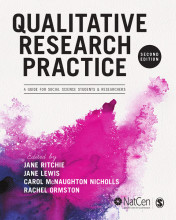Summary: Qualitative Research Practice A Guide For Social Science Students And Researchers | 9781446296202 | Jane Ritchie, et al
- This + 400k other summaries
- A unique study and practice tool
- Never study anything twice again
- Get the grades you hope for
- 100% sure, 100% understanding
Read the summary and the most important questions on Qualitative Research Practice A Guide for Social Science Students and Researchers | 9781446296202 | Jane Ritchie; Jane Lewis; Professor of Social Policy Jane Lewis; Carol McNaughton Nicholls; Rachel Ormston
-
1 Foundations of qualitative research
-
1.2.1 Ontology
This is a preview. There are 3 more flashcards available for chapter 1.2.1
Show more cards here -
Ontology is about realism and idealism. What is realism?
External reality does exist -> objectivism -
What are the three levels of realism?
- empirical - senses
- actual - observing
- real - processes and mechanism -
1.2.2 Epistemology
This is a preview. There are 5 more flashcards available for chapter 1.2.2
Show more cards here -
What is, according to blaikie (2007) the nature of knowledge or truth?
- foundational
- fallibilistic - provisional (tijdelijk)
- value-mediated knowledge
- correspondence theory of truth - obserervation is equal with reality
- coherence theory of truth - multiuple researchers have same result
- pragmatic theory of truth - beleifs are true if they have practical utility -
1.3 Positivism and the scientific method
This is a preview. There are 3 more flashcards available for chapter 1.3
Show more cards here -
What is post-positivism/post-empiricism/falsification? (Popper)
Reality can be known approximately but not for sure. Hypothesis are made and compared with observation -
What is the reasoning of postivism/empiricism?
Inductive reasoning - emprical facts -
What is the reasoning of post-positivism?
Deductive, it is tested against observations -
1.4.1 interpretivism and the origins of qualitative research
This is a preview. There are 2 more flashcards available for chapter 1.4.1
Show more cards here -
What is the reasoning of interpretivism?
Inductive reasoning, but observations are mediated by ideas and assumptions -
1.4.2 advancement and diversification of qualitative research
This is a preview. There are 5 more flashcards available for chapter 1.4.2
Show more cards here -
Discourse analysis - ethnography
Sociologie - how knowledge is produced at different levels -
Personal construct theory
Phycology - pshycologis construct people use to give meaning to their thought and behaviour -
Narrative/biographical methods
Focuses on individual stories to get breadth and depth (cross-disciplinairy)
- Higher grades + faster learning
- Never study anything twice
- 100% sure, 100% understanding
Topics related to Summary: Qualitative Research Practice A Guide For Social Science Students And Researchers
-
The applications of qualitative research
-
Dessing issues - choosing a data collection method
-
Dessing issues - selecting the time frame for research
-
Ethical considerations in qualitative research - theoretical perspectives
-
Ethical considerations in qualitative research - ethical issues raised by qualitative research
-
Desiging and selecting samples - key features of qualitative sampling
-
Desiging fieldwork - designing topic guides
-
In-depth interviews - perspectives on the interview
-
Observation - the nature of observational evidence - the central presence of the researcher
-
Analysis: Principles and processes - Formal analysis - key features of different approaches
-
Analysis: Principles and processes - A question of terminology
-
Analysis: Principles and processes - abstraction and interpretation - an overview
-
Analysis in practice - Abstraction and interpretation - Description: developing categories
-
Analysis in practice - Abstraction and interpretation - Description: mapping linkage
-
Analysis in practice - Abstraction and interpretation - Explanation: accounting for patterns
-
Analysis in practice - Analysing forms of qualitative research
-
Generalising from qualitative research - approaches to generalization
-
Generalising from qualitative research - Reliability and validity
-
Writing up Qualitative research - Qualitative research outputs
-
Writing up Qualitative research - Deciding on narrative and structure
-
Writing up Qualitative research - Displaying qualitative evidence































